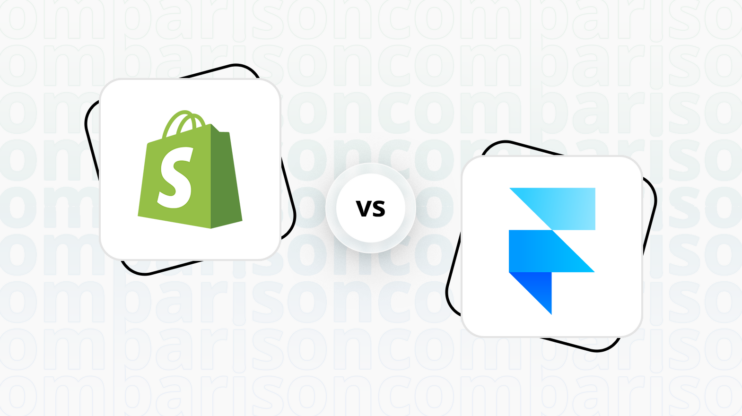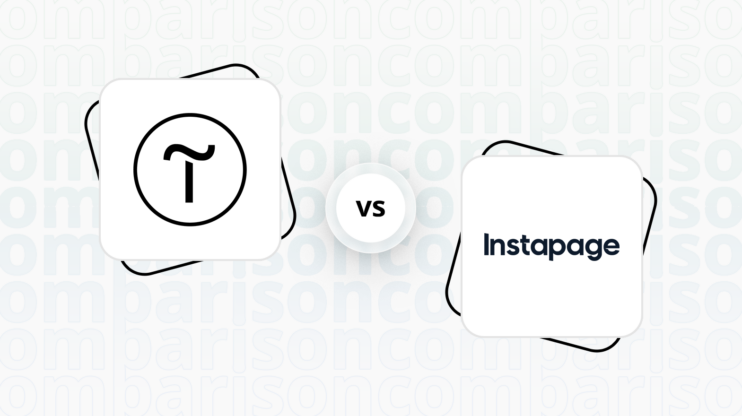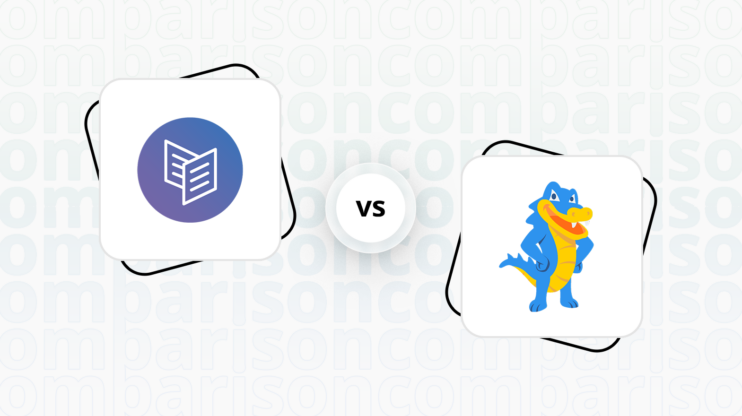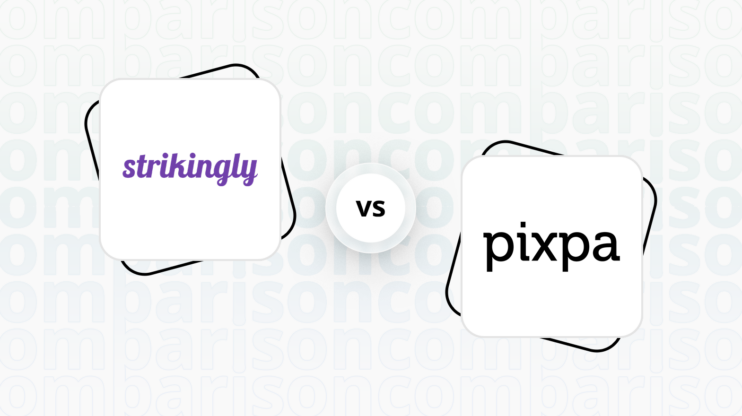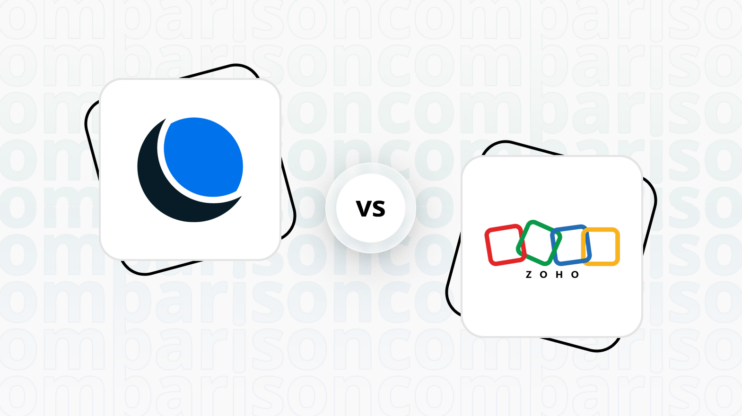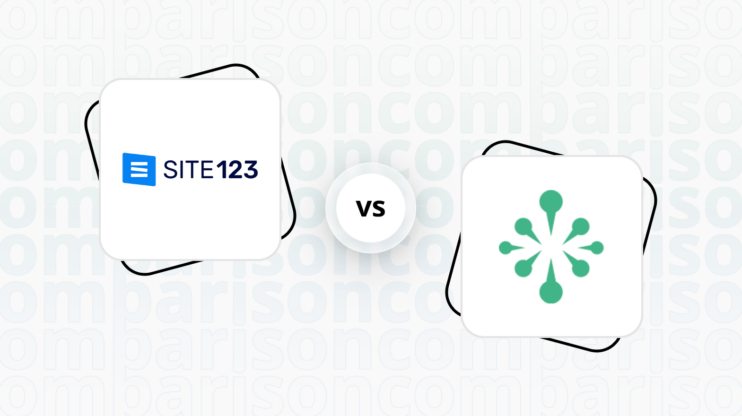Final verdict
BlueHost and Tilda both offer unique strengths, catering to different user needs and preferences.
-
BlueHost (Overall Grade: 6.8/10)
is a versatile platform that combines web hosting with a user-friendly website builder. It excels in ease of use, customer support, and hosting quality, making it a solid choice for users who need a reliable hosting service with integrated website building capabilities. BlueHost’s seamless integration with WordPress and extensive plugin library provide a robust foundation for creating and managing professional websites. However, its ecommerce features and design flexibility are somewhat limited compared to specialized platforms. -
Tilda (Overall Grade: 6.7/10)
stands out for its design functionalities and templates, making it ideal for users who prioritize visual content and typography. Tilda offers a user-friendly, block-based design approach with advanced customization options, suitable for bloggers, small businesses, and digital marketers. Its ecommerce capabilities, while not as extensive as dedicated ecommerce platforms, are sufficient for small to medium-sized online stores. Tilda’s AI content generation and flexible user management features add to its appeal for creative professionals.

|

|
|
|---|---|---|
|
Design functionalities & templates |
7.2 |
8.6 |
|
Ease of use |
8.2 |
8.0 |
|
Ecommerce |
6.8 |
7.2 |
|
Website Editors |
7.3 |
8.0 |
|
Product testing options |
6.2 |
5.9 |
|
Price |
7.2 |
8.0 |
|
Hosting quality |
8.0 |
6.2 |
|
Website speed optimization |
6.5 |
4.9 |
|
Plugins and integrations |
9.1 |
7.6 |
|
Marketing features |
7.3 |
6.9 |
|
Customer support |
7.6 |
5.5 |
|
Security |
8.3 |
7.6 |
|
AI capabilities |
1.5 |
2.1 |
|
User Management |
4.4 |
7.3 |
Best for ecommerce
 6.8
6.8
 7.2
7.2
Verdict
: Tilda edges out BlueHost in ecommerce capabilities, making it a better choice for those focused on creating visually appealing online stores with robust ecommerce functionalities.
-
BlueHost
: BlueHost offers a solid foundation for ecommerce with its integration with WordPress and WooCommerce. It provides essential features like product listings, secure payment gateways, and inventory management. However, when comparing BlueHost vs Tilda, BlueHost’s ecommerce capabilities are more basic and may not be sufficient for more complex ecommerce needs. -
Tilda
: Tilda excels in providing a seamless and visually appealing ecommerce experience. It offers a range of pre-designed blocks and templates, robust product page customization, and integration with various payment gateways. Tilda’s focus on typography and visual content makes it ideal for creating professional-looking online stores without the need for coding skills.
Best for informational & business websites
 7.5
7.5
 8.4
8.4
Verdict
: Tilda is the superior choice for creating visually appealing and professional informational websites, while BlueHost offers a robust, user-friendly platform with extensive customization options through WordPress integration.
-
BlueHost
: BlueHost is a versatile web hosting service that includes a user-friendly website builder. It integrates seamlessly with WordPress, providing access to thousands of themes and plugins. This makes it a strong contender for users who want a professional-looking website with extensive customization options. However, its primary strength lies in its hosting capabilities, which may be more than what is needed for a simple informational site. BlueHost scores 7.5 in this category. -
Tilda
: Tilda excels in creating visually appealing websites with its wide range of pre-designed blocks and templates. It focuses on typography and visual content, making it ideal for bloggers, small businesses, and digital marketers. Tilda’s user-friendly, block-based design approach simplifies the process of creating websites without requiring coding skills. This makes it a more flexible and customizable option for users looking to create professional-looking informational websites. Tilda scores 8.4 in this category.
Detailed comparison
Design functionalities & templates
Design FunctionalitiesRepresents how well each platform allows for creative design and customization of websites.Score Components:
- Template Variety (30%): Range and quality of design templates.
- Customization (30%): Flexibility and options for design alterations.
- User Interface (20%): Ease and intuitiveness of the design process.
- Responsiveness (10%): Adaptability to different devices and screen sizes.
- Innovation (10%): Unique design features and tools.
 7.2
7.2
 8.6
8.6
Winner: Tilda.
Tilda offers a wider range of design functionalities and templates, making it a more flexible and customizable option for users.
BlueHost’s WordPress website builder offers over 300 pre-installed templates and designs to cater to the diverse needs of its users, ensuring that there’s something for everyone, regardless of the niche or industry. These templates are designed to be responsive and SEO-friendly, enhancing the user experience and visibility of the websites.
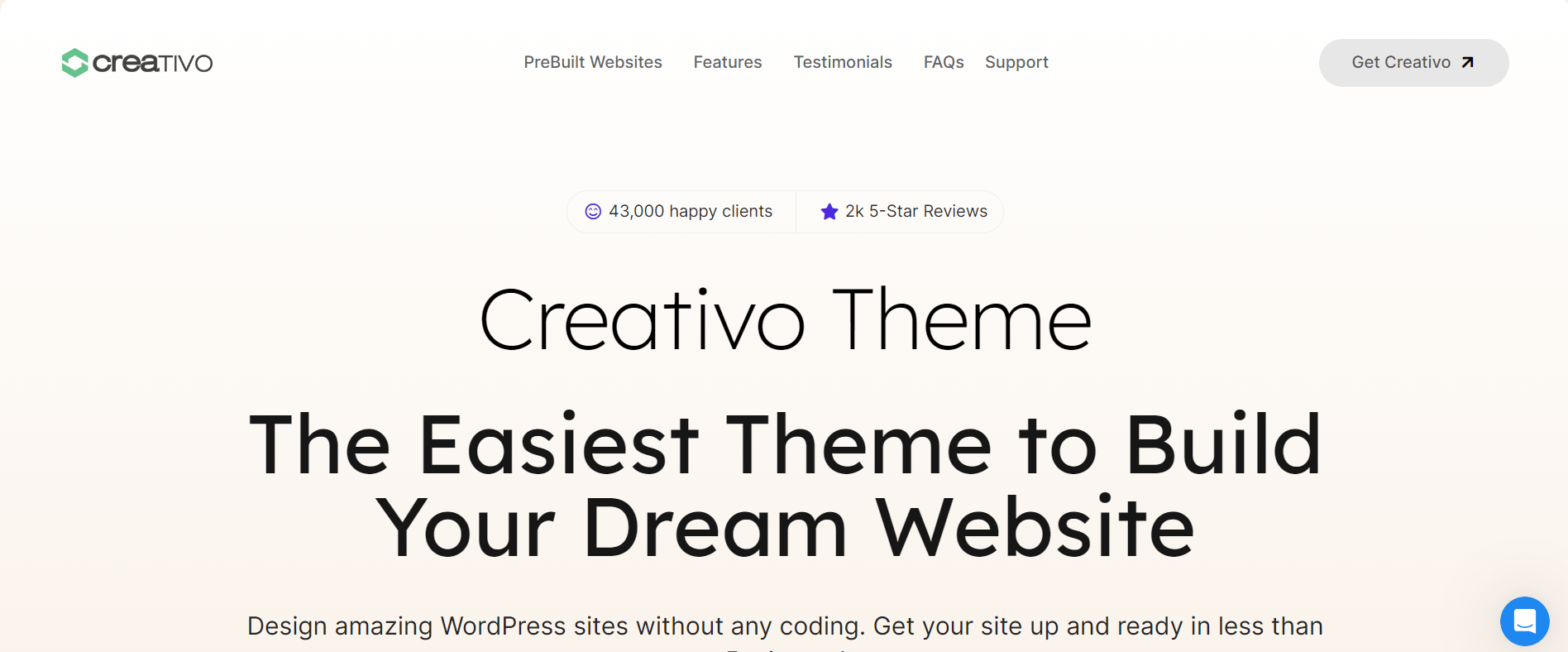
On the other hand, Tilda offers a diverse selection of design templates that are suitable for various types of content, all crafted by professional designers. These templates emphasize gorgeous typography, minimalist blocks, and striking images. Users have the flexibility to modify any template significantly or even start from scratch, ensuring the final website can meet a wide range of design preferences and requirements.
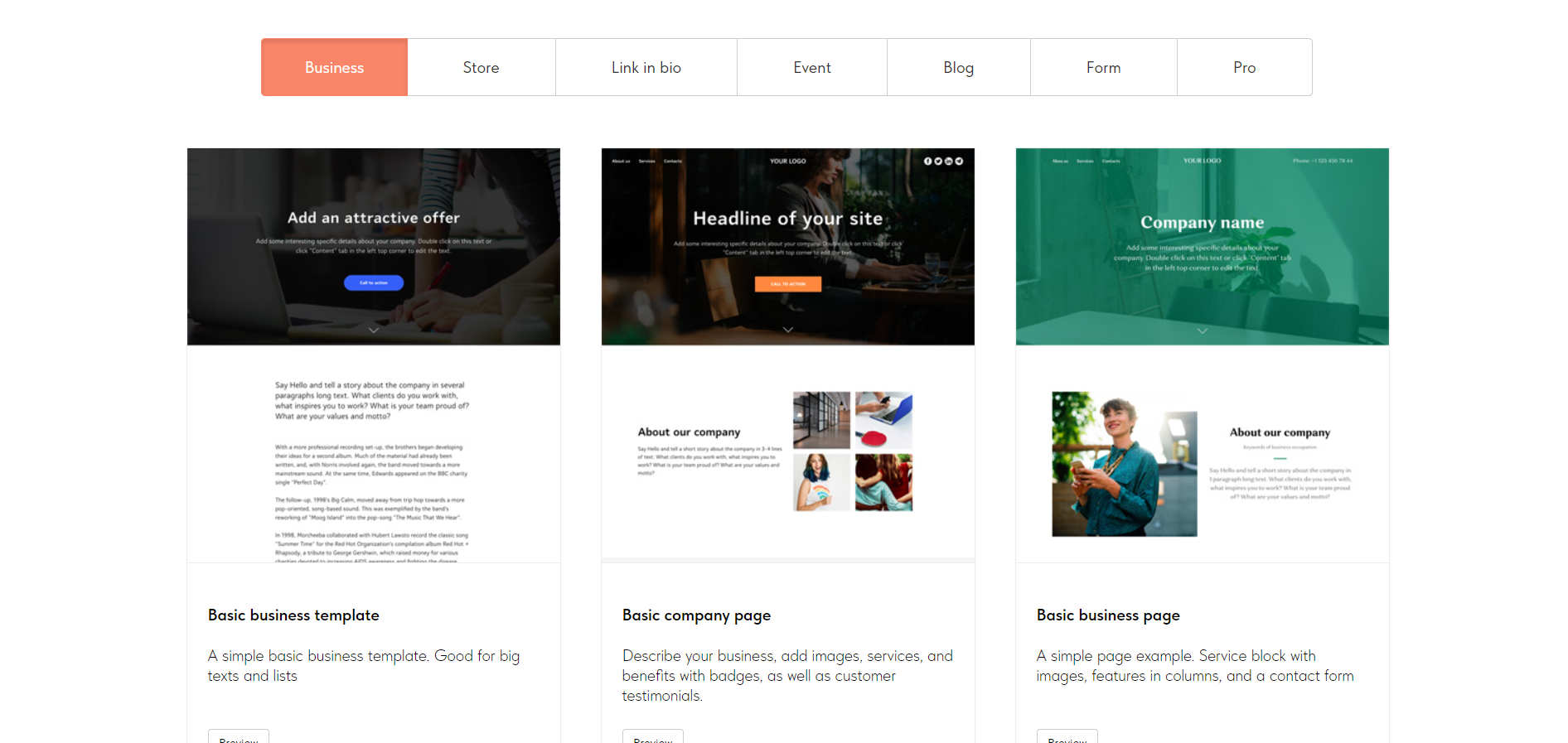

Get a head start on website creation with AI
Create a custom website tailored to your business needs 10X faster with 10Web AI Website Builder!
Ease of use
Ease of useReflects the platform’s overall user-friendliness.Score
Components:
- Learning curve (40%): Quickness and ease of getting started.
- Interface design (30%): Simplicity and intuitiveness of layout.
- User guidance (20%): Quality of tutorials and support.
- Flexibility (10%): Adaptability to various user skills.
 8.2
8.2
 8.0
8.0
🏆 Winner: BlueHost
. Scoring a slightly higher 8.2, BlueHost is designed with simplicity in mind, making it highly accessible for users of all skill levels. Tilda, with a score of 8.0, offers a robust platform but with a slightly steeper learning curve, especially for those new to website building. If ease of use is a priority, BlueHost is the clear winner in this category.
Learning Resources
🏆 Winner: BlueHost
. While both platforms offer solid learning resources, BlueHost goes a step further with its WordPress Academy, providing comprehensive learning resources developed by WordPress experts, making it easier for users to learn and adapt.
For ecommerce
EcommerceMeasures the platform’s effectiveness in supporting online business activities.Score Components:
- Ecommerce themes and templates (20%): Variety and design of templates.
- Product management (25%): Ease of managing and organizing products.
- Payment options (25%): Variety and convenience of payment methods.
- Ecommerce features (20%): Features for managing an ecommerce store.
- Integration (10%): Compatibility with external e-commerce tools and services.
 6.8
6.8
 7.2
7.2
When it comes to ecommerce, both BlueHost and Tilda offer a range of features to help users build and manage online stores. However, Tilda scores slightly higher than BlueHost in this category.

|

|
|
|---|---|---|
|
Ecommerce themes and templates |
6.5 |
6.5 |
|
Product page customization |
7.0 |
7.0 |
|
Payment processing and commissions |
6.8 |
7.5 |
|
POS capabilities |
0.0 |
0.0 |
|
Payment gateways |
7.5 |
7.8 |
|
Product numbers |
6.0 |
6.0 |
|
Additional ecommerce features |
6.5 |
6.5 |
BlueHost ecommerce features:
- Product Listings
- Shopping Carts
- Secure Payment gateways
- Shipping Options and Tax Calculations
- Inventory Management
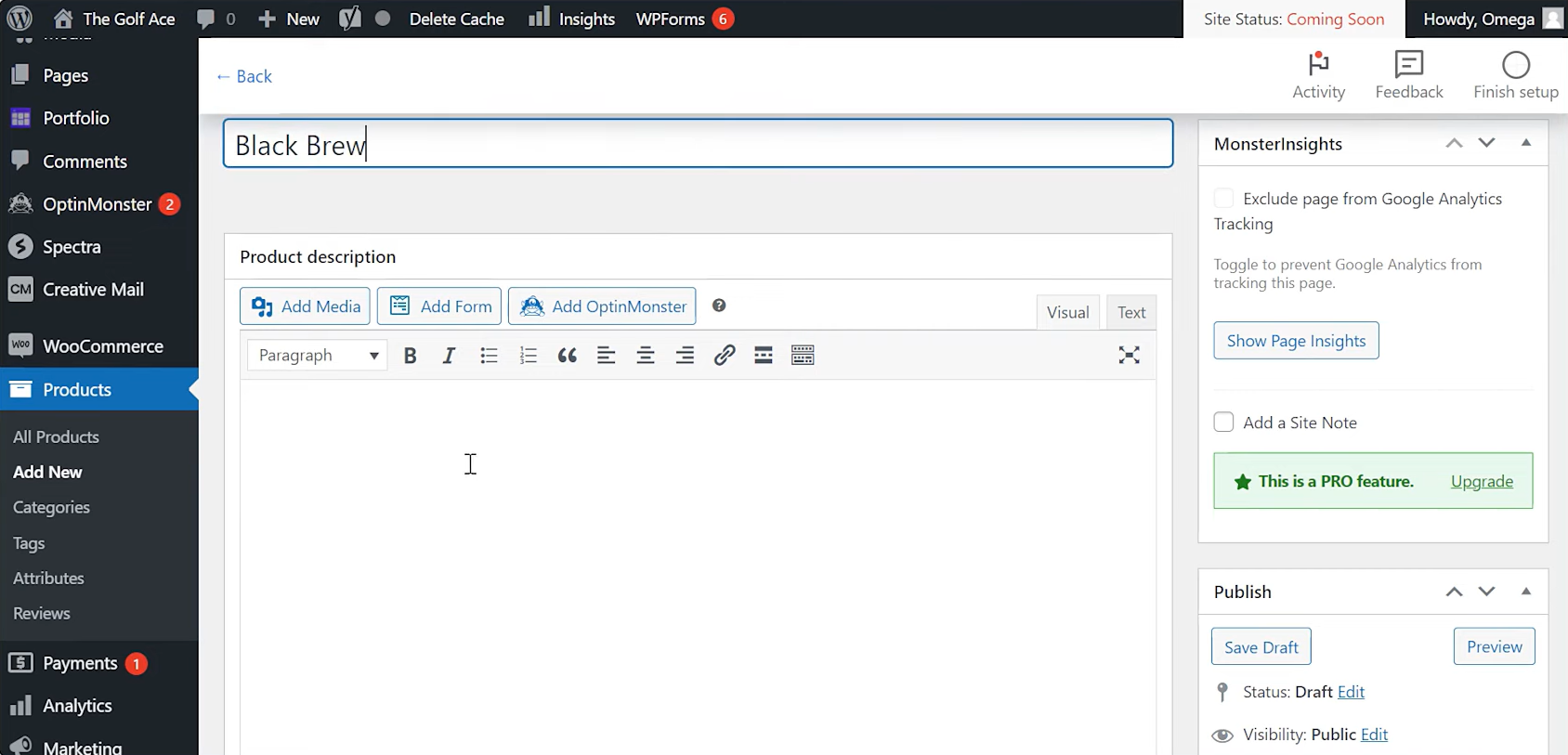
Tilda ecommerce features:
- Product Catalogs and Inventory management
- Payment Gateways integration
- Shipping options
- Order management
- Built-in CRM and marketing tools
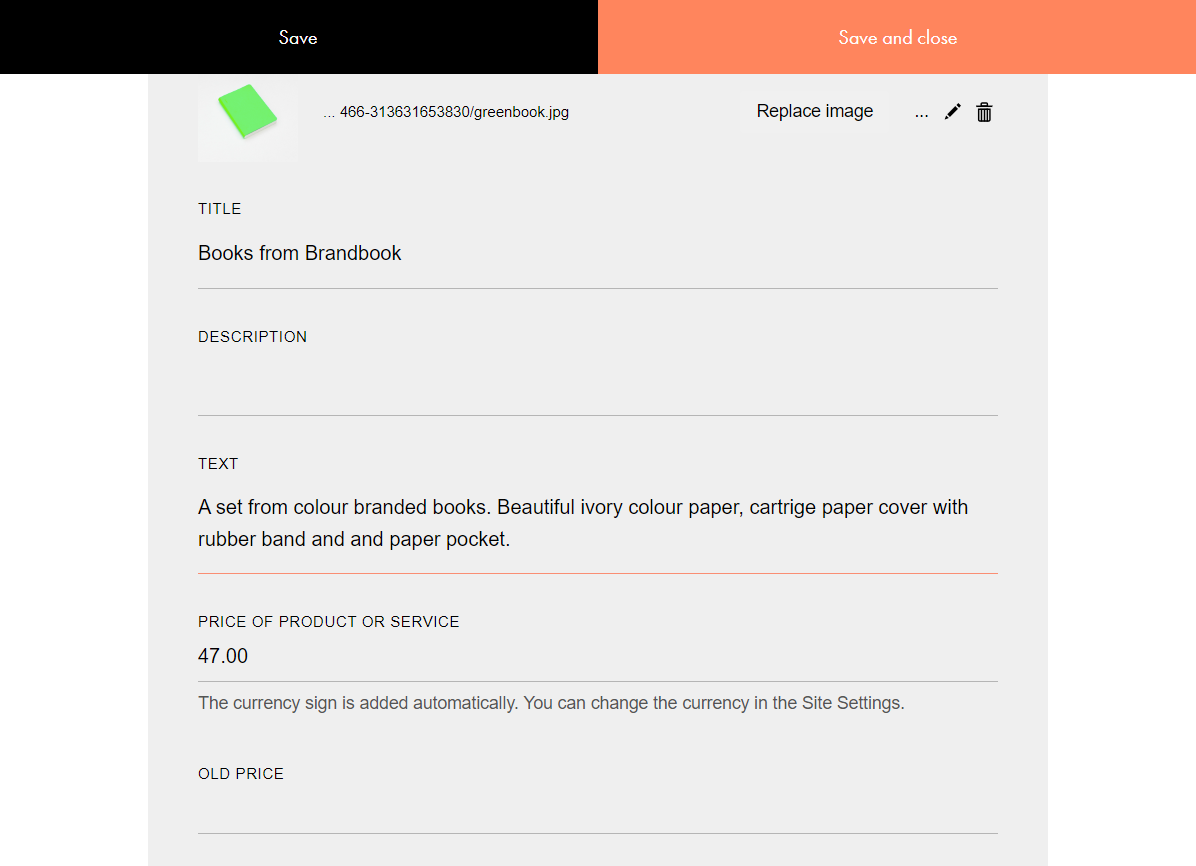
Ecommerce themes & templates
BlueHost’s website builder for eCommerce provides a selection of specific templates designed to streamline the creation of online stores. These templates are optimized for sales, featuring designs that accommodate product galleries, shopping carts, and checkout processes. However, the customization options might be limited compared to more specialized eCommerce platforms.
On the other hand, Tilda allows users to build their eCommerce sites using around 20 ready-made online store templates, emphasizing ease of use and the ability to create a store without needing coding or web design skills. The platform focuses on providing a seamless online shopping experience.
Product page customization
BlueHost’s website builder offers robust customization features for product pages, allowing users to tailor product details like titles, descriptions, images, and pricing according to their preferences. It supports the creation of product variants and options, facilitating the sale of items with multiple choices such as size, color, and material directly from the product page.
Tilda enables a wide range of customizations for product pages in online stores, including the design, e-commerce functionalities, and integration with external services. Features like product variants, delivery options, promotional codes, and diverse payment system integrations allow for a personalized shopping experience.
Payment processing
BlueHost doesn’t directly support numerous payment gateways. However, it does integrate with WooCommerce, a platform that facilitates integration with various payment gateways like PayPal and Stripe. While BlueHost doesn’t impose transaction fees, the payment gateways might. Furthermore, it lacks Point of Sale (POS) capabilities.
The Tilda website builder supports a variety of popular payment systems such as Stripe, PayPal, and 2Checkout, allowing for easy integration to accept online payments. Tilda does not impose additional transaction fees beyond those of the payment gateways themselves. Tilda does not have POS capabilities, Tilda’s focus is on online transactions and e-commerce functionalities, with flexibility for “Cash on Delivery” options.
Website Editors
Website EditorsEvaluates the platforms’ website building and editing capabilities.Score Components:
- Customization tools (40%): Range and power of editing features.
- Editor usability (30%): User experience within the editor.
- Design flexibility (20%): Freedom in layout and design changes.
- Update and maintenance ease (10%): Simplicity of updating and maintaining the site.
 7.3
7.3
 8.0
8.0
🏆
Winner: Tilda
. Tilda, with a score of 8.0, offers a user-friendly, block-based design approach that simplifies the process of creating websites without requiring in-depth coding knowledge. It features advanced customization options through its Zero Block feature, allowing for detailed control over design elements for those needing more specific layouts. The platform supports responsive design, ensuring websites are optimized for all devices, and includes built-in SEO tools, analytics, and a range of integrations with third-party services for extended functionality.

BlueHost’s website builder editor, scoring 7.3, is designed for ease of use, catering to both beginners and advanced users. It offers a section based drag-and-drop interface, allowing users to easily add, remove, and customize elements on their website without needing to code. Users can choose from a wide range of templates and customize them to fit their brand, including adjusting layouts, colors, and fonts. Additionally, the editor provides access to stock photos, SEO tools, and responsive design features, ensuring websites look great on all devices and can rank well on search engines.
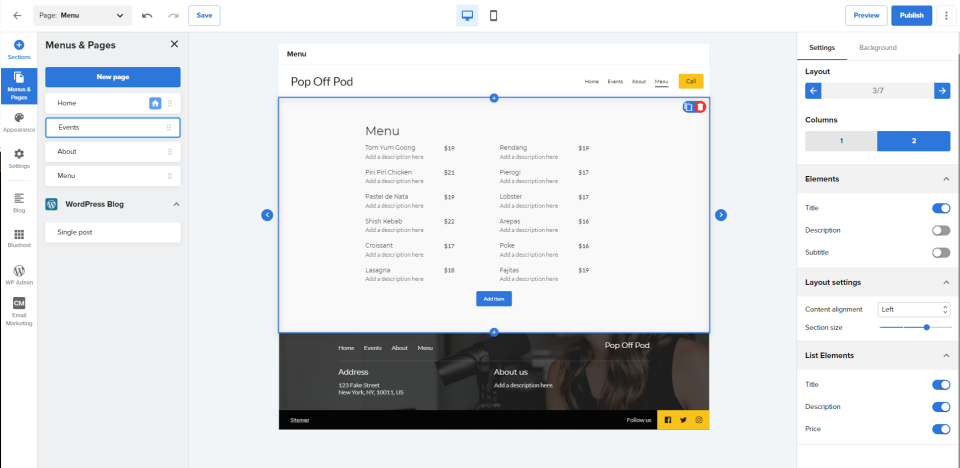
Mobile editor/app
 5.0
5.0
 5.5
5.5
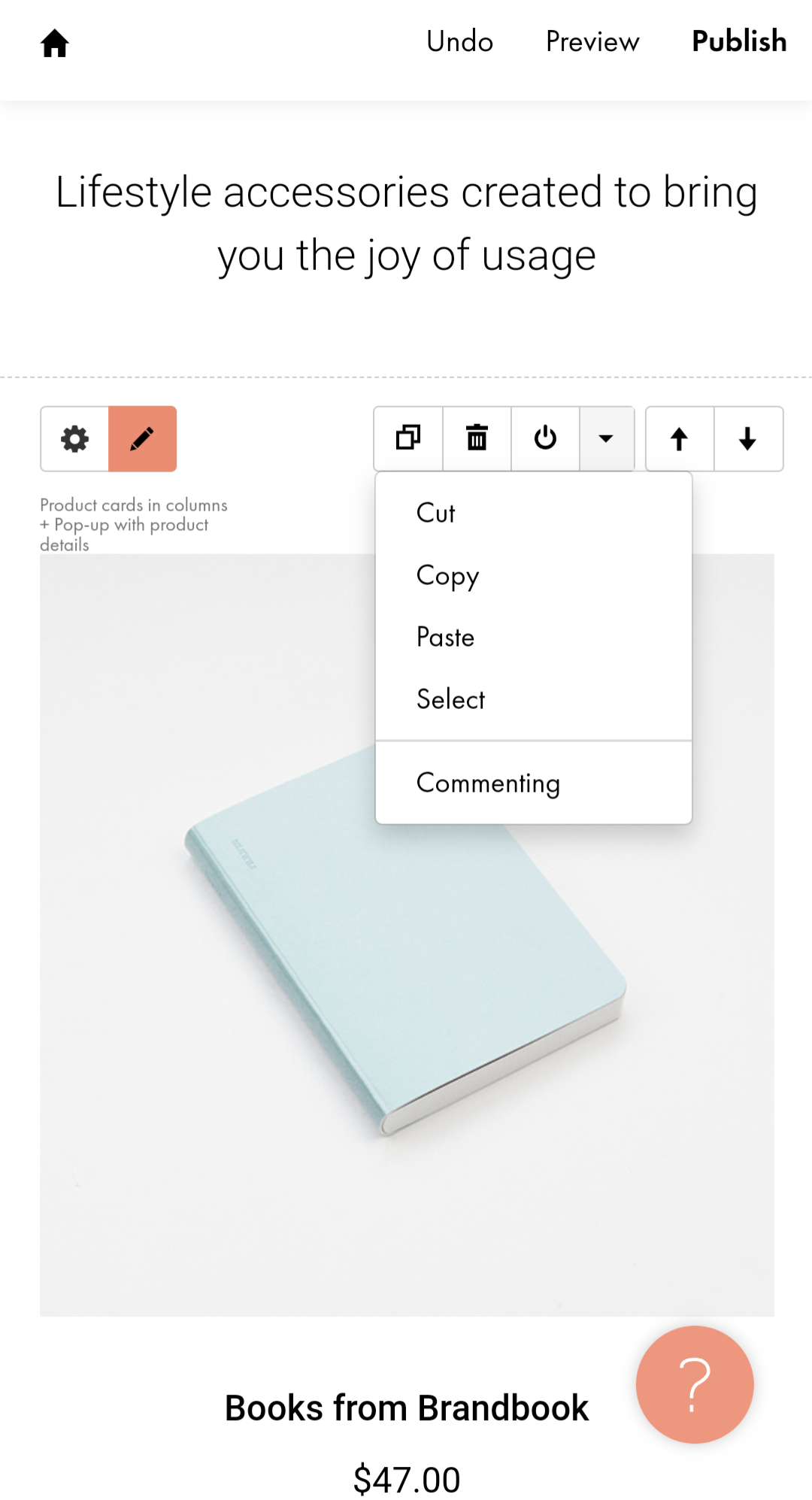
🏆
Winner: Tilda
. Both BlueHost and Tilda do not have a dedicated mobile editor app, but they allow users to edit their websites on a mobile browser. However, Tilda has a slightly higher mobile editor score than BlueHost, indicating that it provides a better mobile editing experience.
BlueHost does not have a dedicated mobile editor app, but users can edit their website on a mobile browser, with some limitations. On the other hand, Tilda does not have a dedicated mobile editor app, but users can manage and edit their websites using the mobile browser version of the editor.
In summary, while both platforms offer mobile browser editing, Tilda provides a slightly better experience, earning it a higher score in this category.
Product testing options
Product Testing OptionsAssesses the options for trying out platform features before commitment.Score Components:
- Trial quality (40%): Extent and usefulness of the trial or free version.
- Feature accessibility (30%): How many features are available to test.
- Trial duration (20%): Length of the trial period.
- Ease of transition (10%): Smoothness of moving from trial to paid plans.
 6.2
6.2
 5.9
5.9
Overall Result
: BlueHost scores slightly higher than Tilda with a score of 6.2 against Tilda’s 5.9. BlueHost does not offer a free or trial version, but it allows users to test premium features within a 30-day refundable period. On the other hand, Tilda offers a free version and some premium features can be tested with this plan. However, Tilda does not offer a money-back guarantee.

|

|
|
|---|---|---|
|
Free Plan |
No |
Yes |
|
Trial Duration |
No | No |
|
Testing Premium Features |
Possible within 30-day refundable period |
Some features can be tested with the free plan |
|
Money Back Guarantee |
30-day money back guarantee |
No |
Price
PriceLooks at the cost-effectiveness and value for money of each platform.Score Components:
- Plan value (40%): What each pricing tier offers.
- Transparency and clarity (30%): Clearness of pricing structures.
- Flexibility of plans (20%): Range of options to suit different budgets.
- Hidden costs (10%): Additional expenses not included in the plan.
 7.2
7.2
 8.0
8.0
Tilda offers better value for the price compared to BlueHost, with a higher price score and a range of price plans to suit different needs.

|

|
|
|---|---|---|
|
Free |
No offering at this amount. |
Free ($0/month): Tilda’s Free plan allows for 1 website with up to 50 pages per website and 50 MB of space per project. It includes a free subdomain on tilda.ws, responsive design on all devices, basic animations, a built-in image and icon library, and Tilda CRM. |
|
$10-$20 |
Basic ($15.99/month): Made for a simple website or blog, 1 website with 10GB SSD storage, Free CDN, Free Domain 1st year, Managed WordPress Hosting, Free SSL 1st year and Chat Support. Value for price: 6.5 |
Personal ($15/month): The Personal plan offers 1 website with up to 500 pages and 1 GB of space. It includes all features of the Free plan plus the ability to connect a custom domain, advanced animations, full access to the Block Library, analytics, SEO tools, and online store capabilities. Value for price: 7.5 |
|
$20-$30 |
Choice Plus ($27.99/month): Ideal for multiple sites needing storage, security, backups, 3 websites with 40GB SSD storage, Free CDN, Free Domain 1st year, Managed WordPress hosting, Free SSL, Free Domain privacy 1st year, Malware scanning, daily site backups are free for the 1st year with the purchase of a 12 or 36-month package. Otherwise, users are required to pay a one-time fee of $35.88 for backup services. Value for price: 7.5 |
Business ($25/month): The Business plan expands capabilities to 5 websites per account, each with up to 500 pages and 1 GB of space, including source code export and API access. It builds upon the Personal plan features with additions suitable for more extensive business needs. Value for price: 9.0 |
|
$30-$35 |
Online Store ($32.99/month): Great for all online selling, built-in eCommerce tools, 3 websites with 40GB SSD storage, Free CDN, Free Domain 1st year, Managed WordPress hosting, Free Domain privacy 1st year, Malware Scanning, Exclusive Theme Store, Store Analytics, Unlimited products, Secure Payment options, Bookings & appointments, Shipping labels, product search and filtering, daily site backups are free for the 1st year with the purchase of a 12 or 36-month package. Otherwise, users are required to pay a one-time fee of $35.88 for backup services. Value for price: 8.5 |
No offering at this amount. |
|
$35+ |
Pro ($39.95/month): Perfect for high traffic, advanced storage, security, 5 websites with 100GB SSD storage, Free CDN, Free Domain 1st year, Managed WordPress hosting, Free SSL, Free Domain privacy 1st year, Malware Scanning, daily site backups are free for the 1st year with the purchase of a 12 or 36-month package. Otherwise, users are required to pay a one-time fee of $35.88 for backup services. Value for price: 9.0 |
No offering at this amount. |
location. As a result in rare cases the prices displayed here can differ from the ones you see on their
websites.
Hosting quality
Hosting
qualityExamines the reliability and performance of the hosting solutions.Score Components:
- Uptime (40%): Consistency and reliability of website availability.
- Speed (30%): Loading times and performance.
- Bandwidth and storage (20%): Sufficiency of resources provided.
- Data centers (10%): Quality and distribution of hosting infrastructure.
 8.0
8.0
 6.2
6.2
Winner: BlueHost
BlueHost offers a range of hosting options with features designed to support websites at various stages of growth, from shared to dedicated hosting. Their hosting plans include technologies to ensure fast load times, such as SSD storage, CDN services, and Cloudflare integration. On the other hand, Tilda offers cloud hosting with up to 1GB storage capacity. However, Tilda does not disclose the locations of its data centers. Considering these factors, BlueHost is the winner in this comparison.

|

|
|
|---|---|---|
|
Do they offer hosting? |
Yes, offers a range of hosting options |
Yes, cloud hosting, with up to 1GB storage capacity |
|
Data Centers: |
6 data centers: Orem and Provo, Shanghai, Mumbai and Hong Kong, London |
Tilda does not disclose the locations of its data centers |
|
Type of hosting: |
Managed WordPress Hosting |
Cloud Hosting |
|
Uptime: |
99.9% |
99.9% |
|
Uptime Guarantee: |
Yes, 99.9% |
No |
Website Speed Optimization
Website Speed OptimizationEvaluates optimization of website loading timesScore Components:
- PageSpeed Score (30%): Google’s score indicating performance optimization.
- Loading Time (30%): The average time until a website is fully interactive.
- Mobile Optimization (15%): Optimization effectiveness for mobile devices.
- Resource Optimization (15%): Optimizing images, scripts, and other heavy resources.
- CDN Usage (10%): Use of CDN to enhance speed across geolocations.
 6.5
6.5
 4.9
4.9
🏆 Winner: BlueHost
Both BlueHost and Tilda have strategies in place for website speed optimization, but BlueHost takes the lead with a higher website speed optimization score and more detailed information on their strategies and Core Web Vital improvements.

|

|
|
|---|---|---|
|
Focus |
CDN, Server Optimization |
Lazy Loading, Image Optimization |
|
Performance Tools |
Google Lighthouse, PageSpeed Insights |
Google PageSpeed Insights |
|
Key Strategies |
CDN, Server Optimization |
Lazy Loading, Image Optimization |
|
Load Times |
Varies widely, depending on optimization and website complexity |
Varies depending on optimization and website complexity |
|
Page Speed Scores Range |
Varies widely, depending on optimization and website complexity |
Varies depending on optimization and website complexity |
|
Core Web Vitals Improvement |
Emphasis on LCP, FID, CLS improvements |
No information provided |
BlueHost, a comprehensive web hosting service that also offers a user-friendly website builder, focuses on CDN and server optimization for website speed optimization. It uses tools like Google Lighthouse and PageSpeed Insights for performance analysis. BlueHost emphasizes on improving Core Web Vitals, specifically LCP, FID, and CLS. However, both load times and PageSpeed scores can vary widely, depending on the optimization and website complexity.
On the other hand, Tilda, a web-based platform designed for creating websites, landing pages, and online stores, focuses on lazy loading and image optimization for website speed optimization. It uses Google PageSpeed Insights for performance analysis. However, Tilda does not provide any information on their Core Web Vitals improvements. Similar to BlueHost, Tilda’s load times and PageSpeed scores can vary depending on optimization and website complexity.
Get a head start on website creation with AI
Create a custom website tailored to your business needs 10X faster with 10Web AI Website Builder!
Plugins and integrations
Plugins and integrationsMeasures the range and effectiveness of additional plugins and integrations.Score Components:
- Variety of options (40%): Range of available add-ons.
- Integration smoothness (30%): Ease of integrating plugins into the site.
- Quality of plugins (20%): Functionality and reliability of the options.
- Custom integration capabilities (10%): Support for custom or third-party integrations.
 9.1
9.1
 7.6
7.6
🏆 Winner: BlueHost.
With a score of 9.1, BlueHost leads the way in plugins and integrations. Its seamless integration with WordPress opens up a vast ecosystem of plugins and extensions, ranging from SEO tools and security enhancements to e-commerce solutions and social media integrations. Tilda, scoring 7.6, also offers a diverse range of integrations, but BlueHost’s extensive WordPress-based plugin library gives it the edge.
Marketing Features
Design FunctionalitiesRepresents how well each platform allows for creative design and customization of websites.Score Components:
- Template Variety (30%): Range and quality of design templates.
- Customization (30%): Flexibility and options for design alterations.
- User Interface (20%): Ease and intuitiveness of the design process.
- Responsiveness (10%): Adaptability to different devices and screen sizes.
- Innovation (10%): Unique design features and tools.
 7.3
7.3
 6.9
6.9
🏆
Overall Winner: BlueHost
. BlueHost stands out for its comprehensive SEO tools, email marketing capabilities, and blogging features. Tilda, while offering a similar range of features, lacks in the area of ads and promotions.
| Marketing Features |

|

|
|---|---|---|
|
SEO Tools |
|
|
|
Email Marketing |
|
|
|
Blogging |
|
|
|
Social Media Integration |
|
|
|
Analytics and Reporting |
|
|
|
Ads and Promotions |
|
|
Customer Support
Customer supportEvaluates the quality and availability of support options.Score Components:
- Response time (40%): Speed of support responses.
- Support quality (30%): Effectiveness and helpfulness of the support.
- Availability (20%): Range of support channels (phone, chat, email).
- Resource richness (10%): Quality of self-help and educational materials.
 7.6
7.6
 5.5
5.5
🏆 Winner: BlueHost
. In the BlueHost vs Tilda comparison, BlueHost takes the lead with a customer support score of 7.6. BlueHost offers 24/7 support through chat and phone, ensuring users can get help whenever they need it. Additionally, technical assistance is available from 7 a.m. to midnight EST, seven days a week, providing a robust support system for users.
Tilda, on the other hand, has a customer support score of 5.5 and primarily offers support via email. While Tilda’s Help Center is comprehensive, the lack of 24/7 support and limited support channels may leave users waiting for assistance. This makes BlueHost the better option for those who prioritize accessible and reliable customer support.
Security
SecurityLooks at the platforms’ security measures and data protection.Score Components:
- Data protection (40%): Safeguards for user and customer data.
- SSL and encryption (30%): Implementation of secure connections.
- Compliance (20%): Adherence to industry security standards.
- Regular updates (10%): Frequency of security updates and patches.
 8.3
8.3
 7.6
7.6
🏆
Winner: BlueHost
. BlueHost offers a comprehensive suite of security features, including SSL certificates, regular backups, and additional security features like SiteLock for malware scanning. Compliance with data protection regulations and a commitment to privacy are central to their service, ensuring users’ data is handled securely.
Although it may not offer the same level of comprehensive security features as BlueHost, Tilda is committed to maintaining a secure platform with a focus on GDPR compliance and built-in security features such as DDoS prevention and HTTPS encryption. However, it falls slightly short in comparison to BlueHost’s more robust security offerings.
AI Capabilities
AI capabilitiesMeasures the effectiveness of AI-driven features and tools.Score Components:
- Automation efficiency (40%): Impact of AI on streamlining processes.
- Personalization (30%): AI-driven customization for users or customers.
- AI-Assisted design (20%): Role of AI in website design and functionality.
- Data analysis (10%): Use of AI in interpreting user data and analytics.
 1.5
1.5
 2.1
2.1

|

|
|
|---|---|---|
|
AI Builder |
|
|
|
AI Ecommerce features |
|
|
|
AI content generation |
Supports integration with AI content generation WordPress plugins |
AI feature for generating website content |
|
Additional AI features |
|
|
🏆 Winner: Tilda
. Although both BlueHost and Tilda have limited AI capabilities, Tilda has a slight edge with its AI feature for generating website content. This feature can generate headlines and text blocks, which can be helpful for users who need assistance with content creation. On the other hand, while BlueHost does not have built-in AI features, it supports integration with WordPress plugins, some of which offer AI capabilities. However, this requires additional setup and may not be as user-friendly as Tilda’s built-in feature.
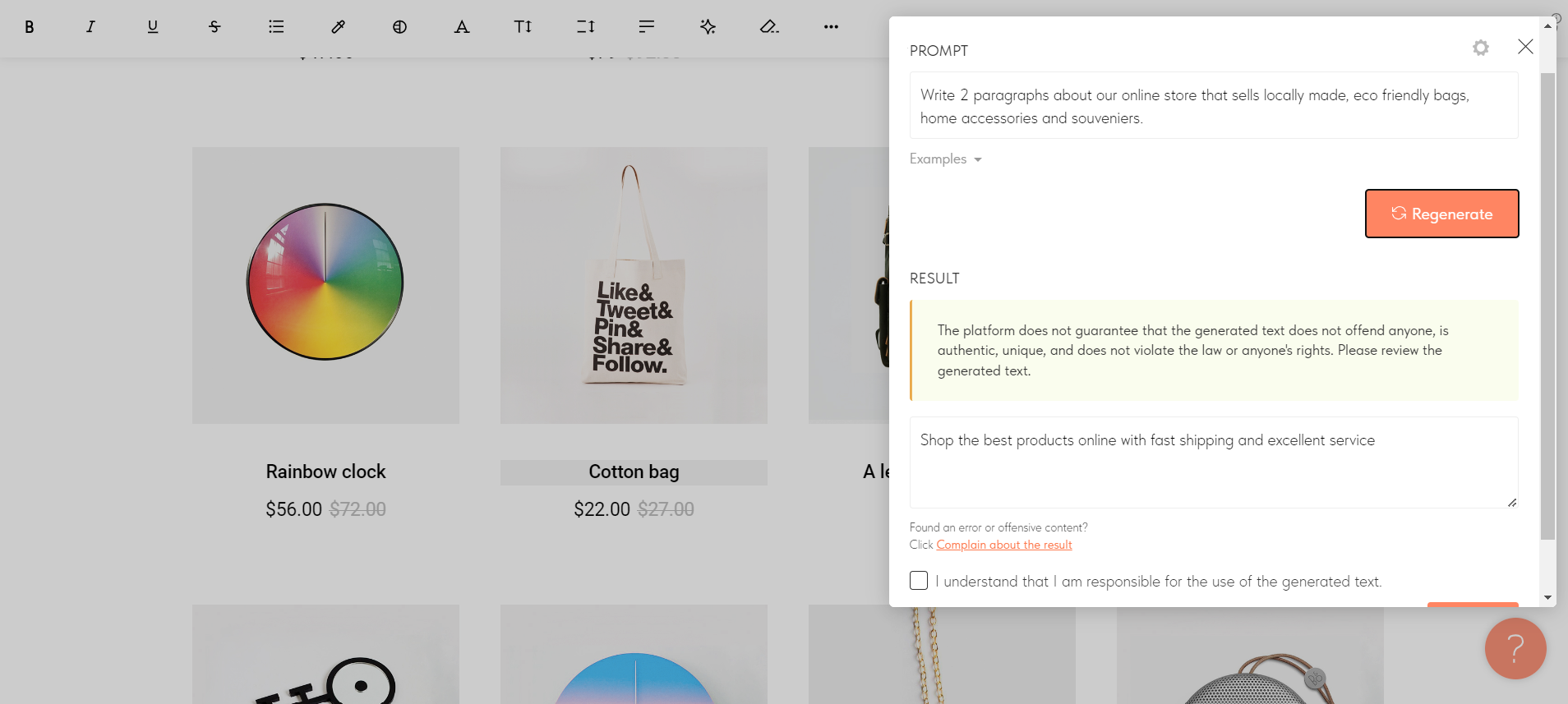
User Management
User ManagementAssesses the platforms’ capabilities in managing user roles, permissions, and accessibility.Score Components:
- Role Customization (40%): Flexibility in creating and defining user roles and
permissions. - Ease of Management (30%): User interface and tools for managing users.
- Access Control (20%): Effectiveness of access control measures for different user
levels. - Scalability (10%): Ability to manage a growing number of users efficiently.
 4.4
4.4
 7.3
7.3
🏆 Winner: Tilda
. Both BlueHost and Tilda offer multi-user management, but Tilda provides more detailed and flexible options.
- BlueHost supports multi-user management, but there’s no specific information about the number of users or their roles and permissions.
- Tilda’s Collaborators feature allows adding teammates with either Full or Limited access. Full access enables collaborators to edit, publish, delete pages, view requests and statistics, and make changes to built-in website services. Limited access allows the project owner to specify what actions the collaborator can perform. This feature is available as a premium offering, and adding more collaborators requires additional payment, with costs adjusted based on previously paid periods. It applies to the entire account, not individual projects, and collaborators can be managed or replaced through the Site Settings.
Unfortunately, neither BlueHost nor Tilda provided a detailed table of user roles and access levels.
Additional Features

|

|
|
|---|---|---|
|
SSL Certificate |
|
|
|
Custom Domain |
|
|
|
Free Custom Domain Included |
|
|
|
International Domains |
|
|
|
Mobile Responsive |
|
|
|
Page Speed |
|
|
|
Website Builder Mobile App |
|
|
|
Convert a Website To An App |
|
|
|
Website Analytics |
|
|
|
Multilingual Sites |
|
|
|
Multiple Users |
|
|
User Feedback
Users appreciate BlueHost for its comprehensive free offerings, including SSL, subdomains, and custom email, along with additional services like free domain registration and CDN. The platform’s intuitive interface and user-friendly website builder cater to both beginners and experienced developers. However, concerns arise regarding the significant price increase upon renewal, limited free website templates, and unresolved technical issues with poor customer support, hindering users’ ability to effectively manage their websites and businesses. Addressing these concerns could enhance overall user satisfaction with BlueHost.
Tilda Publishing receives varied feedback from users, highlighting its strengths in offering a no-code, customizable website building experience with features like Zero Block for personalization and easy backend setup. Users appreciate its affordability, user-friendly interface, and responsive customer support. However, criticisms include buggy font customization, limited design elements, and instability in some of its features. Despite these drawbacks, many find Tilda beneficial for creating professional websites quickly and managing multiple sites under one plan, although some users advise caution due to issues with stability and customer support.
The making of this blog
We followed a clear, step-by-step process to write and research this article.
FAQ
Which is better for ecommerce, BlueHost or Tilda?
Can I create a visually appealing website with BlueHost or Tilda?
How do BlueHost and Tilda compare in terms of ease of use?
Which platform offers better customer support, BlueHost or Tilda?
Are BlueHost and Tilda good options for users without coding skills?










